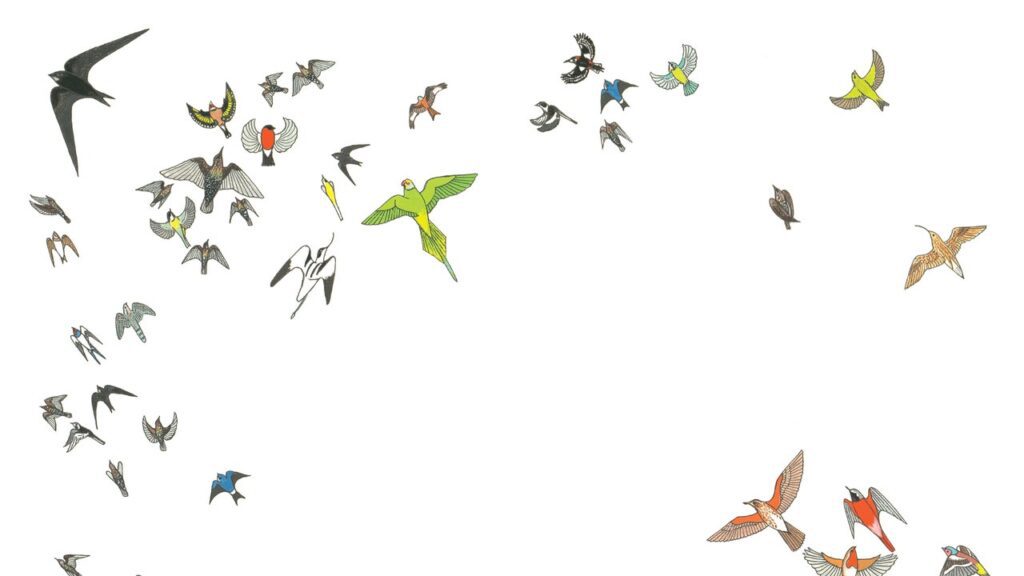
There is music that feels like it was born out of a white-hot spark of inspiration, and there is music that feels like it has come together gradually, like accrued wisdom; the music that Jack Cooper records as Modern Nature falls into the latter category. Across three studio albums, Cooper—a musician originally from the English seaside town of Blackpool, now located somewhere in the countryside of Cambridgeshire —has invented and refined a quietly introspective, semi-improvised acoustic style that nonetheless feels richly sensual and radical in its approach.
Cooper has lived a few musical lives already. He fronted the scuzzy 2010s punk group Mazes and made sunny psych as part of Ultimate Painting before launching Modern Nature. I’m willing to bet the name of this group comes from the 1991 book by Derek Jarman, which documented the artist and filmmaker’s building of a garden amid the arid shingle of Dungeness on England’s south coast, shortly after Jarman had been diagnosed with HIV. That sounds potentially bleak, but Modern Nature was about finding new ways to live, and Cooper’s music feels born from a similar impulse: an attempt to shed the baggage of the past and create something honest and meaningful by embracing nature’s cycles of renewal and rebirth.
Like Modern Nature’s 2022 album Island of Noise, No Fixed Point in Space draws on the language of free improv, but this is a subtler and more muted record than its predecessor, and somewhat stranger in the bargain. Recorded live to tape with Cooper joined by a loose consort of players that includes Spiritualized’s Alex Ward, the Necks’ Chris Abrahams, the veteran experimental vocalist Julie Tippetts, and members of the London avant-garde quartet Apartment House, its gently exploratory chamber music occupies a liminal space somewhere between composition and spontaneity; its loosely notated songs are given space to wander and drift.
The title of No Fixed Point In Space comes from Albert Einstein by way of the dancer and choreographer Merce Cunningham. Cunningham used the term as a way of conceptualizing a group performance without a central focal point, and Cooper borrows it as a guiding precept here, nominating no one leader and empowering his chosen players to find their own route. Take a track like “Murmuration.” Its constituent parts—plucked electric guitar, hushed woodwind, tapped cymbal, and Cooper’s lightly dazed voice—intermingle yet never tethered to one another. The song’s title takes its name from the flocks of starlings that weave and turn as one, a natural phenomenon in line with this album’s affinity with the patterns of nature, but also a useful metaphor for the way the album’s music itself is assembled: each musician a free agent, but all acting together in a state of harmony.
The arrangements are lean and pared back, even as the lyrics erupt with florid descriptions that feel like direct entreaties to the senses. “Sweetness breaks the air in colours/Golden, orange, olive, violet/Feint relief from bent horizon/Withered bow and bramble tight,” Cooper sings on “Cascade,” his voice hushed, like a bird watcher who has caught sight of his quarry through the branches. Thrumming double-bass notes and soft puffs of clarinet hang in the air, or drift softly like pollen on the wind. Moments recall earlier jazz-influenced rock milestones—the melancholic slow burn of Talk Talk’s Spirit of Eden, the deconstructed psych-folk of Radiohead’s The King of Limbs. Perhaps most of all, No Fixed Point in Space reminds me of the band that Brian McMahan formed after Slint’s break-up, the For Carnation: another group that spoke softly but still created something of heavy emotional resonance.
Describing his vision for No Fixed Point in Space, Cooper writes that he wanted “the music and the words to feel like roots, branches, mycelium, the intricacies of a dawn chorus, neurons firing, the unknown.” That appeal to the realms of physics and biology indirectly highlights a distinguishing factor of Modern Nature’s songwriting: a near lack of human presence. Where we see people, they’re usually passive bystanders, lost in a landscape or sheltering from the rain. Just occasionally, we get a glimpse of how these songs might have been shaped by past trauma. The pensive “Orange” reflects on the tiresome routine of passing days, with a repeated refrain—“Don’t let it break you”—that hints at a state of psychic exhaustion.
Largely, though, No Fixed Point in Space feels sealed off from the concerns of modern society, content to exist in its world of nature. The closing “Ensō” takes its name from a Zen Buddhist symbol, a hand-drawn circle representing enlightenment and quietness of mind. The topic is nightfall, the mood serene, and as gentle strummed guitar and brushed cymbal conjure up a vision of dusk, Tippetts and Cooper sing together one last time. “It’s a lot to take in/It’s impossible to see,” they chorus. And then they fall silent and everything is still.
